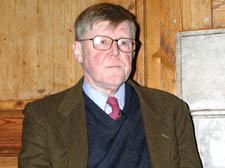
Alan Bennett |
The sage of Gloucester Crescent strikes again
Untold Stories
by Alan Bennett
Faber and Faber/Profile Books, £20 Order this book
Four Stories
by Alan Bennett
Profile Books, £20 order this book
Piers Plowright reviews two books by Alan Bennett that show there’s much more to his work than just gentle Yorkshire sadness
THERE they are, as if at some enormous and slightly crazy family party: shy, gentle Dad – “Nay Alan”, – volatile Mam, in and out of mental hospitals, garrulous Aunty ‘as it subsequently transpired’ Kathleen, upwardly mobile Aunty Myra, musical aunt – the only ‘aunt’ – Eveline, stoical Grandma Peel and the “buried” suicide of Grandad Peel, batty Miss Shepherd with the van – “something could be done with old raincoats possibly”, dons, neighbours, playwrights, literary and artistic ghosts, mad King George, sad folk gazing at the sea, jolly folk on bicycles, conscripts and cognoscenti, the chattering classes and the whispering classes, all chronicled with the same blend of acid and compassion that tells you, without a shadow of a doubt, you are in Bennett Country.
And if that’s what you want, as the woman says on the Network Rail recording, these books are for you.
Where does he come from, the sage of Gloucester Crescent? And I don’t mean Yorkshire or Oxford or Shaftsbury Avenue. In a way he comes out of the blue, a distinctive and wry tone of voice from his first appearance in the revue Beyond the Fringe to his latest South Bank and Broadway Triumph, The History Boys, delighting in being serious and very funny at the same time, mocking unmercifully the things he half loves, self aware and self deprecating, hardly ever angry but often ruthlessly revealing, personally very shy but a brilliant public performer. Bennett is Bennett.
But there are, I think, ancestors. Gossipy John Aubrey, with his passion for the absurdities of the world and his amiable snobbery, namesake Arnold B, particularly in his early northern comedies like The Card, sardonic, wounded Philip Larkin – the subject of one of Bennett’s essays in Untold Stories – with his capacity for stopping the heart while appearing to ignore it, and even his polar opposite, DH Lawrence – both writers can do tenderness plus grime supremely well.
Where Bennett goes beyond all these authors is in his versatility: short-story writer, playwright, TV and radio dramatist, screenwriter, diarist, performer, monologueist and documentary maker.
And the material in these two books, hardly any of it new by the way, comes from all these places. Because Bennett is a great frontier crosser and fact and fiction co-exist so subtly in his work that you’re sometimes not sure which you’re reading. In Four Stories, is Miss Shepherd in The Lady in the Van real or is she an invention? How much of Aunty Kitty in Father! Father! Burning Bright is Aunty Myra from Armley Yorks? Which Anglo-Catholic vicar in NW would nervously recognise himself in The Laying On Of Hands? And so on.
Untold Stories makes a good accompaniment to the stories and indeed to all of Bennett’s work. In his introduction he writes how being diagnosed with cancer in 1997 and given a 50/50 chance of recovery, concentrated his mind wonderfully. “I had regarded some of these writings as tidying up, topics I’d been wanting to write about but had never got round to,” he said.
“A death sentence, like moving house, meant that the tidying up had to be done and done quickly: there was a deadline.”
So we get, apart from the wonderful family memoir that begins the book, and extracts from Bennett’s voluminous diaries, essays on Art and Architecture and Authors, reflections on theatre, TV and radio, and, in the concluding section, Ups and Downs, an account of the cancer that might have killed him.
Here all the Bennett virtues come into play: a wonderful ear and eye even at the grimmest moments, the ability to be quite dispassionate about his own treatment, while noticing touchingly funny and tragic moments in another part of the ward, and a complete refusal to be sentimental.
As he observes: “For a writer, nothing is ever quite as bad as it is for other people, because, however dreadful, it may be of use.” And that, I suppose, is the key. If there’s ever to be a Bennett family motto, it should read: Everything Matters.
I was talking to a friend about Bennett’s work, appropriately enough in a north London Hospital, the other day. “Oh,” he said, a la Aunty Myra, “I can’t be doing with him. All that slow Yorkshire sadness.” I said: “Read these two books and you’ll see there’s more to him than that.” Which there is.
ad.
|